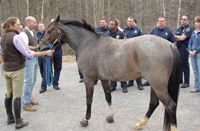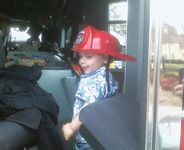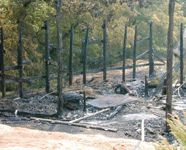Fire-safety seminar: a win-win-win solution
Equine practitioners need not go far these days before being reminded that they and their clients are facing difficult economic times. Rising gas prices, feed prices, seed and fertilizer costs, reduced travel to horse shows and generally lower consumer spending suggest a tough business year for many veterinarians.
Equine practitioners need not go far these days before being reminded that they and their clients are facing difficult economic times. Rising gas prices, feed prices, seed and fertilizer costs, reduced travel to horse shows and generally lower consumer spending suggest a tough business year for many veterinarians.
Business experts generally recommend that, in such situations, the best defense is a good offense. Provide the best quality veterinary service possible and market that service so potential clients know it is available.
Marketing, according to the American Marketing Association, is defined as the activity, set of institutions and process of creating, communicating, delivering and exchanging offerings that have value for consumers, clients and society at large.

Sharing expertise: Veterinarian Kenneth Marcella, second from left, and others in the horse-owning community explain horse-handling procedures to attentive firefighters, who in turn provided fire-safety tips at a seminar in Milton, Ga.
Basically it means letting potential clients know who you are and what you have to offer. Billions of dollars are spent worldwide annually on marketing, but the problem faced by most equine practitioners and small businesses is a circular trap. Marketing is necessary to increase business but it is expensive. Businesses must first be successful enough to generate the money needed to pay for the marketing designed to make businesses busier.
Client education meetings, open houses and similar events are commonly used by equine practitioners for marketing purposes, but these can be costly endeavors. The best solution might be a popular, educational event that would be inexpensive, easy to organize and put on, and that would benefit clients and their horses, the community and the equine veterinary practice. Enter the win-win-win solution.
Fire and barn safety is a topic that is important to all clients. There have been countless articles written on the subject, and most owners are aware of the potential devastation that a stable fire can cause.
Recently this author stumbled onto arguably the best possible marketing situation while attempting to help out with some simple fire-safety programs. Our community, north of Atlanta, has a large number of horses; it was suggested by members of the local hunter/jumper association that a fire-safety and emergency-readiness program be developed.

Learning while playing: Many children play with toy fire trucks, but few get to climb aboard a real one as this youngster did at the seminar.
Horse owners wanted to make sure that fire-department members know the locations and layouts of their farms, should problems occur. Concern was voiced that fire-department personnel often are not familiar with handling horses, yet they would be the ones possibly in the best position to save horses in a disaster scenario.
We took our concerns and ideas to the local fire department and were encouraged by the response.
Pre-planning for emergency
Fire departments aren't allowed to inspect non-commercial structures unless invited onto the private property. Yet the majority of departments welcome the chance to look over barns and stables and to go through a process they call "pre-planning."
"Pre-planning allows the department to walk through a barn or facility and become familiar with the location of entrances, gate and security codes if needed, access for hydrants or ponds or swimming pools to be used as water sources," explains Milton, Ga., Fire Marshall Chad McGiboney. "It allows firefighters to draw up a plan to localize where in a barn the horses are stalled, where the electrical breaker boxes are and where the paddock gates are for turning out horses in the event of an evacuation. Pre-plans are filed at the station and can be quickly accessed when an emergency call comes in."

Loss of life, property: A community fire-safety seminar aims to prevent barn fires like this one, in which horses perished and the building was leveled.
These walk-through visits often result in suggestions that may reduce a fire risk. A possible additional benefit is a reduction in insurance premiums some companies offer if such safety inspections are done.
By visiting farms, the fire department is better able to do its job when necessary and a strong bond is developed between the department and the community.
Because fire-department salaries, manpower concerns and funds for equipment usually come up as local voting issues, the Milton department was delighted to become more visible among members of the generally vocal horse-owning community and they committed to our project.
As our ideas for a fire-safety and emergency-readiness seminar took shape, some clients suggested that, as much as we could learn from firefighters, there may be some things we could teach them as well.
Many fire-department personnel do not have much horse-handling experience, yet they will be the ones going into barns trying to catch, halter and lead horses to safety in the event of a fire. And they will be doing it with cumbersome gear and breathing devices that make them look and sound frightening to horses.
It was suggested that the firefighters take some horse-handling lessons from clients as part of our seminar. Again the response was enthusiastic.
A convenient barn location was chosen and a Saturday event was planned. The fire department came in force and brought a number of trucks that horse owners could see up close to appreciate the size and weight of these vehicles.
Many barns are not built to provide access for such vehicles and more than one barn has burned to the ground because a fire truck could not negotiate a tight turn or enter a narrow access road to a horse stable. An additional benefit to having the trucks at the event was that it gave young children a thrill to climb onto and take pictures.
The trucks, children and horses provided local media outlets with entertaining story lines and a simple call to the local newspaper and television stations resulted in more than one printed piece and an 11 p.m. TV news story on the event.
Educational experience
At the actual seminar, department officials educated clients and horse owners as to barn and fire safety precautions. Representatives of local equine-insurance companies welcomed the chance to speak to clients about insurance and safety concerns.
Clients then split the firefighters into groups and spent some time teaching horse-haltering and handling skills. It was interesting to see professional firefighters known for their bravery reduced to nervousness when asked to pick up a horse's hind foot.
Clients came away with a new appreciation for what fire fighters are expected to do and with a bit of pride in what they themselves could teach others about horsemanship.
A bucket of mixed-up halters was used for a "quickest to halter the horse" competition between fire-department squad members that provided entertainment for firefighters and horse owners alike.
A discussion about other aspects of emergency readiness prior to our event revealed that the fire department had no provisions or training related to sling rescue for horses.
Every year there is an unfortunate horse trapped in an old well, stuck in a muddy stream, a swimming pool or an icy pond. These rescues require an equine sling and trained personnel.
The youth group of the local hunter/jumper association decided it would make this year's fund-raising project goal to purchase a sling and to raise enough additional funds to send a member of the fire department to an equine emergency-rescue seminar in order to become proficient at sling rescue.
Proceeds from food sales at horse shows and from some special classes at certain shows will be used to provide these funds. Once the sling and equipment are purchased, local equine veterinarians will work with fire department personnel to help learn how to correctly and safely use this needed gear.
When this plan was announced at the seminar, the news media immediately requested to be informed of these dates so that they could come back and do follow-up stories and newscasts.
Establishing a bond
We started with a simple plan to try to provide some fire-safety education to horse owners.
We added fostering a strong bond between the equine community and the fire department and threw in some education and new horse-handling skills for department personnel.
The exposure, marketing and name recognition that this event generated for an equine practice (at no cost) was truly remarkable and the best result is a long-term project (an equine sling-rescue team) that ultimately will benefit all horses in our area.
It became the ultimate win-win-win solution to marketing in somewhat difficult times.
Not all locations have the equine density seen in our area or the enthusiastic and committed fire department, but a similar event might just work in other practice areas as well.
Most fire departments respond favorably to increased community presence and local youth horse or 4-H or pony clubs could easily take up the equine sling project.
It is interesting to note that this entire event has been so well received by the horse-owning population in this area that after only four months the juniors have already met their fund-raising goals and a sling is on order.
The fire department allocated funds to help send a member to an upcoming equine emergency rescue seminar to be held in Kentucky later this year.
On a sadder note, less than three weeks after our fire-safety and emergency-readiness seminar, a stable fire in a neighboring town destroyed a barn and killed six horses.
We subsequently received requests from clients to make our fire-safety day a yearly event.
Dr. Marcella is an equine practitioner in Canton, Ga.
Podcast CE: A Surgeon’s Perspective on Current Trends for the Management of Osteoarthritis, Part 1
May 17th 2024David L. Dycus, DVM, MS, CCRP, DACVS joins Adam Christman, DVM, MBA, to discuss a proactive approach to the diagnosis of osteoarthritis and the best tools for general practice.
Listen